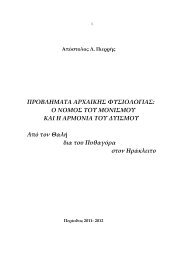Commentary on the Beginning of Damascius' De Primis Principiis
Commentary on the Beginning of Damascius' De Primis Principiis
Commentary on the Beginning of Damascius' De Primis Principiis
You also want an ePaper? Increase the reach of your titles
YUMPU automatically turns print PDFs into web optimized ePapers that Google loves.
33[10] I say “<strong>of</strong> multiplicity” and “<strong>of</strong> distincti<strong>on</strong>”, not “<strong>of</strong> a multiplicity” o r “<strong>of</strong> adistincti<strong>on</strong>”, because at <strong>the</strong> level <strong>of</strong> abstracti<strong>on</strong> <strong>on</strong> which we move we have to dowith multiplicity or distincti<strong>on</strong> or whatever in general ( ἁπλῶς), in <strong>the</strong>ir abstractnature, and not with a particular multiplicity or distincti<strong>on</strong> etc. Evidently in orde r for<strong>the</strong>re to exist a specific multiplicity, <strong>the</strong> subsistence <strong>of</strong> multiplicity in general musthave been <strong>on</strong>tologically secured, as it were, in advance.[11] “At any rate” since <strong>the</strong> ἀριθμός may be any specific multiplicity inaccordance with standard Neoplat<strong>on</strong>ic usage.[12] Of every number = (in Neoplat<strong>on</strong>ic parlance) <strong>of</strong> every multiplicity which issubjoined to a principle from which it flows as <strong>the</strong> numbers flow from <strong>the</strong> unit. Not =<strong>of</strong> every number, like 3 or 4.[13] Of course <strong>the</strong>y include <strong>on</strong>es, but not <strong>the</strong> One; <strong>the</strong>y even include <strong>the</strong> <strong>on</strong>e(not <strong>the</strong> One) as opposed to <strong>the</strong> two or three, say; but not <strong>the</strong> One which is evenabove this oppositi<strong>on</strong> <strong>of</strong> <strong>the</strong> <strong>on</strong>e to any determinate or indeterminate multiplicity.This again will be treated fully later.[14] This in effect means that <strong>the</strong>re is no o<strong>the</strong>r dependence <strong>of</strong> B apart from<strong>the</strong> <strong>on</strong>e passing through A. And this is, ultimately, always <strong>the</strong> case with strictlyM<strong>on</strong>istic Systems. (By M<strong>on</strong>ism I understand <strong>the</strong> view according to which <strong>the</strong>re is <strong>on</strong>ly<strong>on</strong>e ultimate principle – not <strong>the</strong> vie w that <strong>the</strong>re is ultimately <strong>on</strong>ly <strong>on</strong>e sort <strong>of</strong>subsistents or realities or entities or things ). We shall have more to say <strong>on</strong> <strong>the</strong>philosophical meaning <strong>of</strong> M<strong>on</strong>ism later <strong>on</strong>.[15] I emphasize <strong>the</strong> singularity <strong>of</strong> D.’s positi<strong>on</strong>. But <strong>of</strong> course we are aware <strong>of</strong>its sy stematic c<strong>on</strong>necti<strong>on</strong> with cognate attempts to solve <strong>the</strong> same problems. Forinstance, to refer <strong>on</strong>ly to <strong>the</strong> obvious, it is normal Proclean doctrine that what is in<strong>the</strong> result καθ᾿ ὕπαρξιν is in <strong>the</strong> cause κατ᾿ αἰτίαν; and <strong>the</strong>re seems to be just adifference in formulati<strong>on</strong> between this and D. ’s view. Certainly I am <strong>the</strong> last to wishto argue from possibly accidental differences in formulati<strong>on</strong> to real disagreement indoctrine. If I insist <strong>on</strong> <strong>the</strong> matter, it is because I believe to be able to back <strong>the</strong>apparent difference by assigning a different “mechanism” for <strong>on</strong>tological derivati<strong>on</strong> toD. and, to remain within <strong>the</strong> example chosen, Proclus. But <strong>of</strong> this later.On <strong>the</strong> o<strong>the</strong>r hand, it should be noted that D does not seem to propound thisview in oppositi<strong>on</strong> to o<strong>the</strong>r Neoplat<strong>on</strong>ists. He c<strong>on</strong>trasts it to Speusippus’ c<strong>on</strong>cepti<strong>on</strong> –and even this in a qualified way ( ἔδοξε λέγειν 3.1). But again we must equally not










